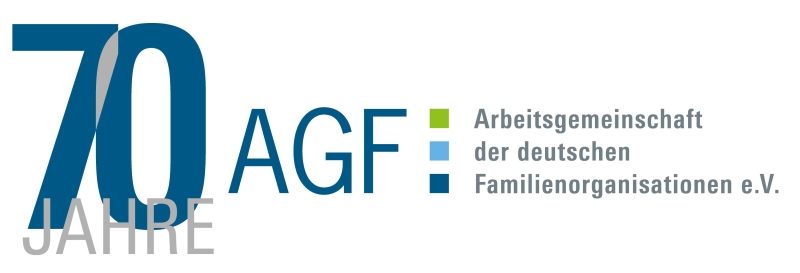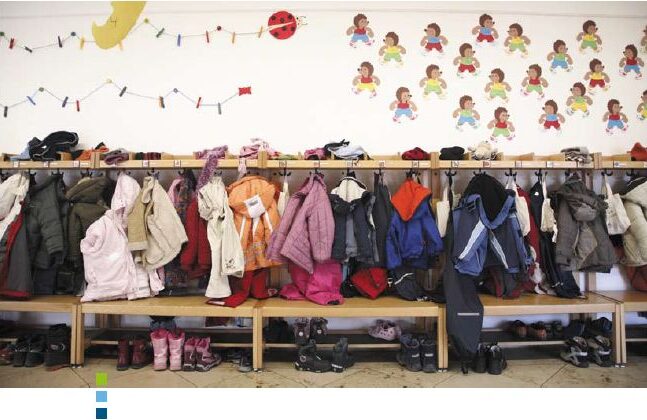[7. 4. 2016] On occasion of the current debate on quality child care facilities AGF has published a position paper. The German family organisations aim for high quality child care facilities. Therefore in their position paper they suggest concrete criteria for quality standards.
The English version of the position paper can be downloaded here
Areas of action for high-quality education, care and nurturing in day care centres
Currently, around 2.6 million children under the age of six are cared for in childcare centres and in day care in Germany. The number of children attending a childcare facility is rising constantly, especially among the under-threes. On average, every third child in this age group is cared for in a childcare centre or in day care, just as almost for all of the three- to six-year-olds. The majority of parents choose external childcare for their children. The legal entitlement to a childcare place from the age of one, which has been in force since 1 August 2013, has accelerated this trend, while also revealing the extent of the demand for places.
At the same time, families remain the primary places for the upbringing and education of children. Parents bear the responsibility for the education and personal development of their children but they increasingly exercise this responsibility in cooperation with childcare facilities. Policymakers have reacted to the growing demand for childcare places and have specifically promoted the expansion of childcare centres and day care. However, there has been little talk in public discussion or in politics about the further enhancement of quality. Despite the principle that every child has a right to continuous development and to education to become personally independent and socially competent, good quality continues to be regarded as rather less of a priority politically.
However, the quality of care has a great influence on children’s development. Quality differences in pre-school care can account for developmental differences of up to one year. Children from families with low levels of stimulation or stress in particular can benefit considerably from good childcare. Inadequate quality of care, on the other hand, has a negative impact on all children, including children from stimulation-rich families. Various national and international studies have repeatedly shown that investment in early support for children pays off. Good early childhood education and care can compensate for difficult conditions and promote future opportunities more effectively than they can later in school, adolescence or adulthood. Similarly, they contribute to reducing educational disadvantages, overcoming poverty and stabilising lives courses, both economically and socially. In so doing, they benefit not only the children but also society.
In Germany, the publication of the NUBBEK study in 2012 raised public awareness of the issue of quality and exposed a distinct need for action. The educational quality of childcare was rated as mediocre, and in every tenth facility it was deemed to be completely inadequate. Nevertheless, there is still no systematic recording of the quality of education and care in Germany and also no uniform procedure for quality development and assurance.
Improvement in the quality of childcare is therefore urgently needed. This demands at least as much political will as does the increase in the number of childcare places. In addition, this requires considerable additional expenditure in the area of early education. The federal government, the Länder and the local authorities share responsibility for finding viable ways of financing such a strategy. In view of the tight budgets of the municipalities and the introduction (2009) of the debt brake, it seems inevitable that the federal government, in addition to the Länder, will be permanently involved in the funding of public childcare. Raising quality is costly – but an important investment in the future.
The goal of high-quality care must not be put on the back burner. If it is, the losers will be the children, especially those who have had a difficult start in life. The needs of the children, based on their respective life situations, must be at the centre of the quality campaign. This also includes consideration of children’s rights, from which arise a claim to the highest possible quality of care facilities and which set an initial framework in terms of content, for example through the right of every child to education, play, participation and self-development.
In order to ensure a consistent quality of care everywhere in Germany, binding, uniform, scientifically based nationwide standards for childcare centres, as well as in day care must be introduced. If, in the following, the AGF deals exclusively with quality improvement in childcare centres, this is not because this form of care is of greater value than any other but because of the massive expansion of childcare centres and the fact that parents predominantly choose this type of care. From the point of view of the family associations united in the AGF, the following quality aspects must be taken into account: general access to childcare, including opening hours, the qualification and further training of professionals, the professional:child ratio and the maximum group size, the development of guidelines for educational and care work, the nurturing and educational partnership and long-term quality assurance.

